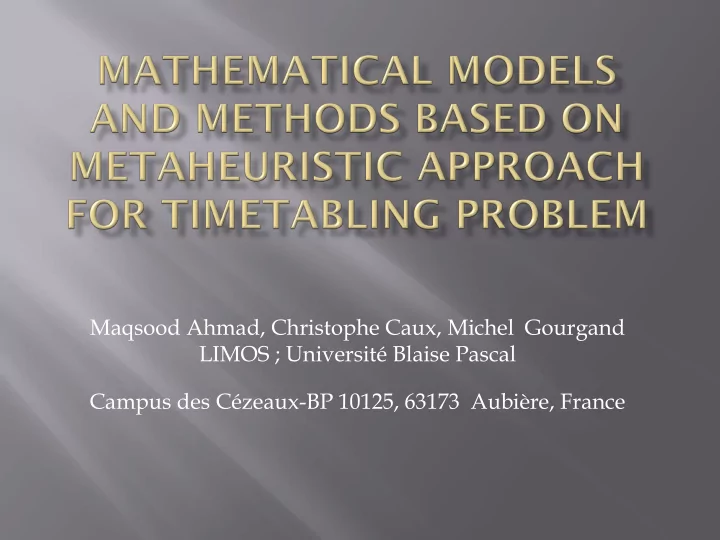

Maqsood Ahmad, Christophe Caux, Michel Gourgand LIMOS ; Université Blaise Pascal Campus des Cézeaux-BP 10125, 63173 Aubière, France
Introduction Constraints Problem Description Formulation Solution Techniques
Time Tabling Problem Timetabling can be generally defined as the activity of assigning, subject to constraints, a number of events to a limited number of time periods and locations such that desirable objectives are satisfied as nearly as possible.
educational timetabling employee timetabling sport timetabling transport timetabling
Course Timetabling Problem A course timetabling problem can be defined as the problem of assigning a number of lectures to a limited number of time periods by using specific resources in accordance with a set of constraints.
Constraints Soft Constraints Hard Constraints their satisfaction shows their satisfaction is quality of solution and is mandatory not mandatory
Our problem is generalization of International Timetabling Competition 2007, track: curriculum based course timetabling problem ITC 2007:CB-CTT Days, Timeslots Courses and Teachers Rooms Curricula
Formulation Linear integer programming Parameters, Sets, Sub sets, Decision variables Objective Function
Initialization Evaluation Extinction Selection Cross over Mutation Apply proposed local search Apply infection in population to chromosomes New population
Chromosome Representation Period Period Period Period Period 1 2 3 4 5 Day 1 c001 c002 c025 c109 c104 Room 1……….. Day 2 c115 c002 c025 c109 c104 Day 3 c105 c002 c125 c425 - Day 4 - - - - - Day 5 - - - - - Room 2……….. Period Period Period Period Period Room 3……….. 1 2 3 4 5 . . Day 1 c008 c009 c205 c189 c385 . Day 2 c006 c004 c879 - - Room N……….. Day 3 - - - - - Day 4 - - - - - Day 5 - - - - -
Used an elitist natural selection operator for timetables eradication. Eradicate 20 % of timetables in each generation. Roulette wheel selection to choose parents for breeding
Cross over We used multiple point cross over. We choose these points randomly. For each gene, randomly choose a number between 0 and cross over rate . We take father or mother gene according to value of this random number. Mutation For each gene, Randomly choose a number between 1 and 1000. If the number is less than the mutation rate then randomly choose a gene from the current timetable and swap it with the current gene.
Pseudo Code of Memetic Algorithm Algorithm Pseudo code for Memetic Algorithm (MA) Input : A problem instance I Set the generation counter g := 0 While (solution_colony population_size < n) do Create a timetable by random initialization method Repair this timetable by proposed repair strategies Calculate the cost of timetable Enter timetable to the population colony End while While the termination condition is not reached do Replace 20 % members of the colony
While (solution_colony. population_size < n) do Choose two parents via roulette wheel selection Child solution generated by applying the uniform crossover operator with a cross over probability Apply mutation over child solution with a mutation probability Calculate the cost of child solution Child solution is applied with proposed local search If cost of local search got child solution is less than cost of child solution, accept it otherwise choose child solution Enter this timetable to the population colony End while g := g + 1 After random number of generations, apply infection to the population colony End while Output : The best achieved solution for the problem instance I
Thanks for your attention
Recommend
More recommend